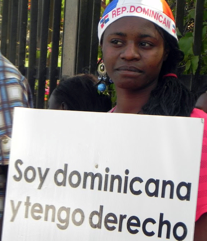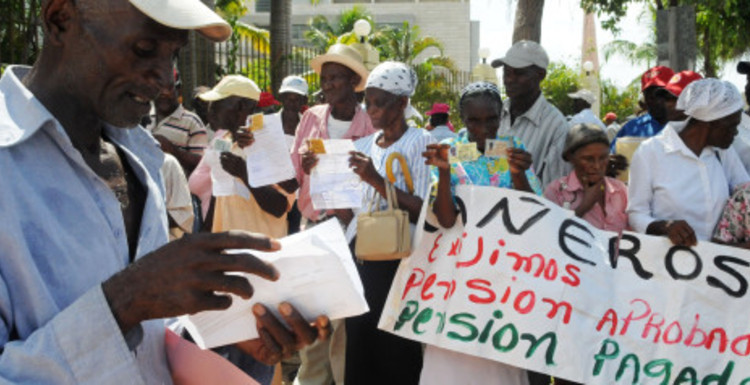A Stand Against Statelessness: Haitian-Dominicans and Refugees Protest Against Statelessness in the Dominican Republic
As one of the most culturally and geographically diverse countries in the Caribbean, the Dominican Republic is regionally recognized for its growing economy and wealth of natural resources. With a GDP estimated at around $98.74 billion USD in 2012 and significant growth in telecommunications, tourism, and free trade zones, there is no question that the country’s economy is flourishing in comparison to other neighboring Latin American countries across the hemisphere. [1] However, while tourists and foreigners flock to the Dominican Republic’s long sandy beaches and the world class resorts lining its coasts, groups of Haitian refugees and Dominicans of Haitian origin have gathered for years in the streets and in the courtyard of the government offices in front of the National Palace to demand recognition and an end to their “statelessness.” [2]
For decades, unregulated Haitian migration to the Dominican Republic has resulted in a significant population within the country whose political, economic, and social status is uncertain, and who is vulnerable to widespread discrimination and human rights abuses. As a result of the high rates of unemployment and political instability, hundreds of thousands of Haitians have consistently migrated to the Dominican Republic in search of employment, which is all too often low paying and temporary under the most brutal of conditions. The private sector of the Dominican Republic has done little to improve the situation, as many plantations, resorts, and construction companies throughout the country depend heavily on migrant laborers to perform unskilled work.
The period following the January 12, 2010 earthquake in Haiti marked a new era of Haitian migration to the Dominican Republic. In addition to the steady flow of economic migrants that have been pouring into the country for decades, Dominicans have had to bear the economic and social burden of a new wave of Haitian refugees seeking to escape the widespread destruction and massive cholera outbreak that followed the deadly 7.0 magnitude earthquake. [3] The Dominican Republic was one of several countries that allowed for a short grace period in which Haitian refugees were permitted to enter the country temporarily to receive disaster relief aid and desperately needed medical attention. Although the number of border crossings by earthquake refugees has decreased slightly as Haiti has continued to rebuild, patience and sympathy have been fading in the eyes of Dominican authorities responsible for the repatriation of the nearly 500,000 new Haitian refugees that entered the country following the earthquake. [4] Forced deportation efforts of Haitian individuals by Dominican police and military personnel have been prevalent throughout the country, and in some cases, discriminatory in the views of a number of international human rights advocacy groups, such as Jesuit Refugee Services International, [5] Refugees International, [6] and the United Nations High Commissioner for Refugees (UNHCR). [7] Reports and commentaries on the situation by each of these three organizations have been keen to highlight the personal accounts of numerous individuals in the Dominican Republic who were subjected to immediate interrogation or deportation by authorities simply due to their appearance or inability to show official documentation of their citizenship. [8]
Opponents of transnational integration in Dominican society have continued to respond to the recent protests primarily with ignorance and prejudices deeply rooted in the country’s long history of international immigration, particularly illegal immigration of individuals of Haitian origin. Haiti is often viewed as the poorer neighbor on the island of Hispaniola, which the country shares with the Dominican Republic. As Haiti scholar Robert Maguire, Professor of Practice of International Affairs at George Washington University, who has previously been quoted in the New York Times, would argue, “when Haitians leave, to the Dominican Republic and to other places, they tend to do well or at least better than in Haiti, so they keep leaving.” [9] Thus far, the Dominican government has been unsuccessful with the task of introducing a legal framework compatible with international norms to address the question of the status of Haitian immigrants and their descendants. [10]
The most recent demonstrators have been asking President Danilo Medina and other political officials in the Dominican Republic to repeal the Central Electoral Board resolution 12-07, which they claim denies them their identity. The 2007 pronouncement by the Dominican civil registry known as Resolution 12 restricts Dominicans’ access to identity documents such as birth certificates and national identity cards. Confirmed into law in 2008, the resolution allows the provisional suspension of state-issued identity documents on the basis of any irregularities pointed to by Dominican authorities concerning the individuals in possession of these official documents within the country. [11] The resolution was implemented as a way to control the growth of the already overflowing immigrant population living within the country illegally and potentially prevent more immigrants from crossing over the extremely porous and relatively unpatrolled border between Haiti and the Dominican Republic. Furthermore, in January 2010, the Dominican constitution was amended to require that at least one parent be a legal resident in order for a child born in the Dominican Republic to automatically acquire citizenship. In practice, however, there have been cases in which the children of immigrant parents who are legal residents are also being denied birth certificates for illegitimate circumstances.
These new policies have distinctly targeted Haitian immigrants and their families. The failure of a child’s parents to produce appropriate legal documentation and proof of residence may result in that child being stripped of his or her citizenship even if he or she had been born and had been living in the Dominican Republic for years. Numerous violations have been committed by migration officials, security forces, and other authorities responsible for the issuance of birth certificates and identity documents to those born and those living in the country. [12] Haitian immigrants and their descendants are regarded as having illegal status if they lack both Dominican birth certificates and identity cards or if they lack Haitian passports, visas, or other work-related migration papers that would establish their right to be in the country. However, it would not be uncommon for individuals born and raised in the Dominican Republic, who have every intention of and right to be granted citizenship, to become victims of the discriminatory provisions of these policies. The lack of access to official documentation impedes a person’s enjoyment of many fundamental rights including public education enrollment, freedom of movement, the right to marry and work legally, and access to health services and social security along with related benefits.

In addition to all too frequently being unable to obtain any type of official documentation from their country of origin, many Haitian refugees and their descendants not only endure social exclusion, but also endure the consequences of being “functionally stateless.” Statelessness refers to the sense of homelessness and insecurity that many of these individuals are forced to feel due to an absence of linkage between them and a homeland nation. Additionally, the social, economic, and cultural rights of these individuals are often at risk in their new homeland if they lack authentic Dominican birth certificates, if they have Haitian sounding names, or if they are black and speak accented Spanish. [13]
The question that has become the center of discussion and controversy repeatedly within the intense immigration debate currently taking place in the Dominican Republic is whether there should be a limit on who is entitled to live a life of greater opportunity. Although a significant number of political leaders in the Dominican Republic may fear being accused of betraying national interests for supporting immigration reform, a national dialogue is essential in order to address the growing issues of discrimination, statelessness, and inter-ethnic conflict within the country. The ongoing protests led by Haitian immigrants and their descendants represent only the beginning of a powerful movement that could potentially change the perception of equality in the Dominican Republic. The Dominican bureaucracy must recognize that all persons born and all persons living in Dominican territory, regardless of their ethnic origin, have the right to identity, nationality, and the right to live a life of non-discrimination. The voices and chants of the thousands of stateless individuals in the Dominican Republic will continue to be heard in the large cities and crowded streets of this beautiful island nation until all individuals in the country being affected by statelessness are finally able to have a permanent place to call home.
Kinsey Norton, Research Associate at the Council on Hemispheric Affairs
Please accept this article as a free contribution from COHA, but if re-posting, please afford authorial and institutional attribution. Exclusive rights can be negotiated.
For additional news and analysis on Latin America, please go to: LatinNews.com and Rights Action
[1] CIA World Factbook, “Dominican Republic,” last updated 2012, https://www.cia.gov/library/publications/the-world-factbook/geos/dr.html.
[2] “Haitian Dominicans Again Protest Statelessness,” Dominican Today, 24 May 2013, http://www.dominicantoday.com/dr/poverty/2013/5/13/47598/Haitian-Dominicans-again-protest-statelessness.
[3] Disasters Relief Committee, “Haiti Earthquake Facts and Figures,” last updated 2011, http://www.dec.org.uk/haiti-earthquake-facts-and-figures.
[4] Randal C. Archibold, “As Refugees From Haiti Linger, Dominicans’ Good Will Fades,” The New York Times, 30 August 2011, http://www.nytimes.com/2011/08/31/world/americas/31haitians.html?pagewanted=all&_r=0
[5] Jesuit Refugee Services USA, “Here I Was Born: Stateless Dominicans Seek Recognition,” 14 March 2012, http://jrsusa.org/RefugeeVoice_Detail?TN=DTN-20120307111406.
[6] Refugees International, “Where We Work,” accessed 23 July 2013, http://www.refugeesinternational.org/where-we-work/americas/dominican-republic.
[7] United Nations High Commissioner for Refugees, “2013 UNHCR Regional Operations Profile – North America and the Caribbean,” last updated 2013, http://www.unhcr.org/pages/49e4915b6.html.
[8] Servicio Jesuita a Refugiados Latinoamérica y el Caribe, “Rep. Dominicana: La Dirección de Migración Deporta a Menores Violando la Dignidad Humana y Las Tratados Internacionales,” 27 June 2013, http://sjrlac.org/noticias_detalle?TN=NEWS-20130702095404&L=3.
[9] Archibold, “As Refugees From Haiti Linger.”
[10] Bridget Wooding, “Contesting Dominican Discrimination and Statelessness,” Latin American Faculty of Social Sciences Peace Review 20.3 (2008): 366-375.
[11] Jesuit Refugee Services, USA, “Here I Was Born: Stateless Dominicans Seek Recognition,” 14 March 2012, http://jrsusa.org/RefugeeVoice_Detail?TN=DTN20120307111406.
[12] “Refugiados Haitianos Piden Documentación Legal,” Listin Diario, 23 June 2013, http://www.listindiario.com/larepublica/2013/6/23/281758/Refugiadoshaitianos-piden-documentacion-legal.
[13] Wooding, “Contesting Dominican Discrimination.”


